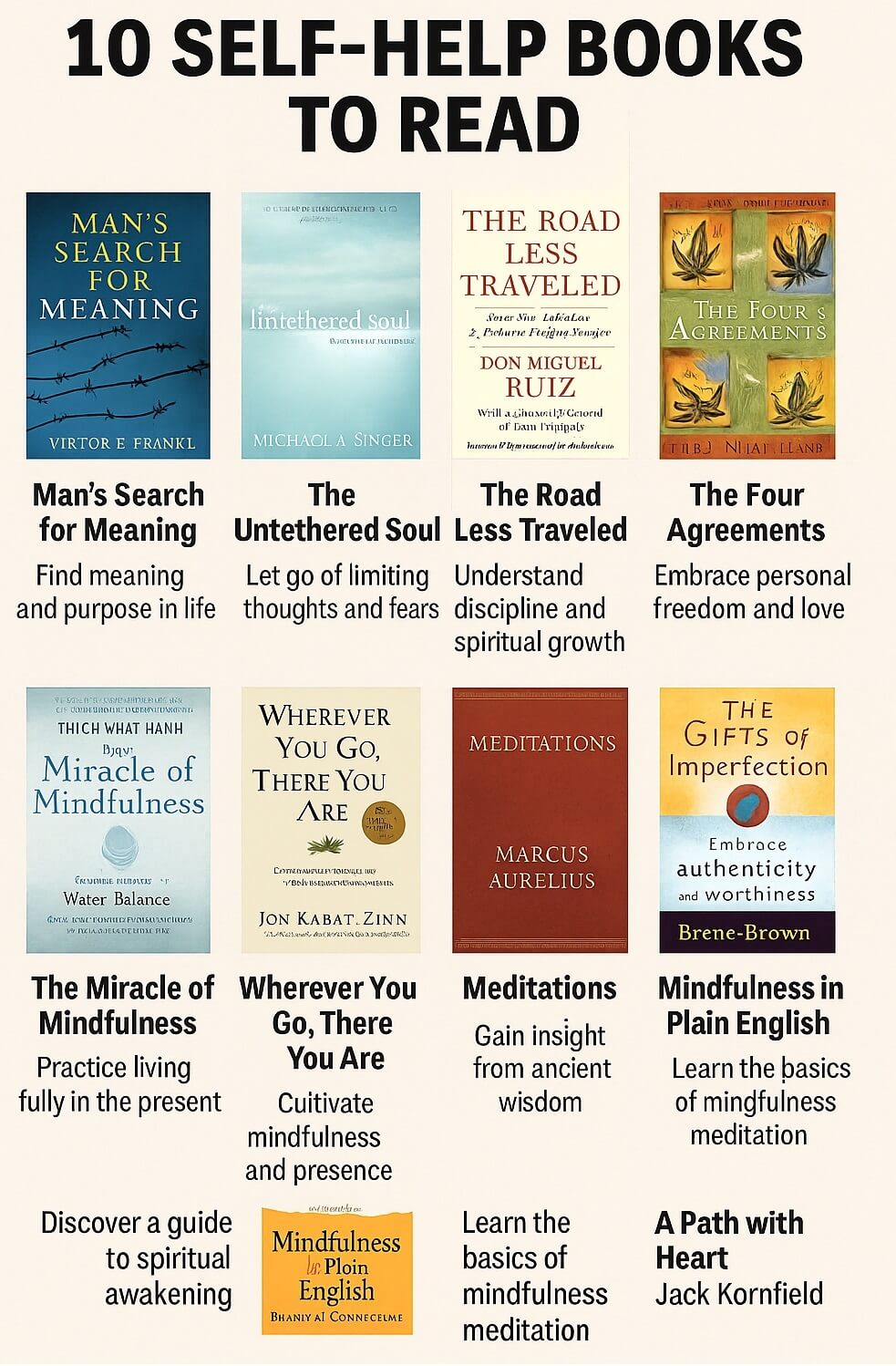
10 Spiritual Self-Help Books Every Adult Should Read
Why this reading list helps
Life brings work deadlines, family duties, and private worries. Many adults want steady practices that support clarity, meaning, and calm. Research gives useful guidance here. A large review in a leading medical journal reported small-to-moderate improvements in anxiety and depression after about eight weeks of mindfulness training, with some benefits still present at 3–6 months (standardized mean differences around 0.22–0.38).
Guided reading as self-help—often called bibliotherapy—has shown benefits for mood over months, especially when paired with simple structure. A growing set of reviews links purpose or meaning with lower distress and better emotional well-being.
This guide brings those threads together. Each recommended title teaches a practice you can try the same day. Short exercises appear under each book, plus a six-week plan and journal prompts to turn reading into change.
Table of Content
- 10 Spiritual Self-Help Books Every Adult Should Read
- How the books were chosen
- The books
- Six-week practice plan (read less, apply more)
- Questioning skills that turn reading into growth
- Research snapshot
- How to make the reading stick
- Final Thought
- FAQs
How the books were chosen
-
Evidence fit: The core skills—mindful attention, decentering from thoughts, values-based action, compassion, and purpose—match findings from peer-reviewed studies and reviews.
-
Accessibility: Clear language, short chapters or modular sections, and practices suitable for busy adults.
-
Reliability: Bibliographic details checked on publisher pages for each book.
The books

1) Man’s Search for Meaning — Viktor E. Frankl
Why read it: A psychiatrist and survivor reflects on suffering, choice, and meaning. The book offers a steady lens for hard days and a humane method—logotherapy—to orient action.
Try this today: List three “meaning anchors” you will serve this week: a person, a task, and a guiding value. Keep the note visible.
Research link: Greater purpose links with lower depression and anxiety across many samples.
2) The Untethered Soul — Michael A. Singer
Why read it: A plainspoken guide to watching inner talk without getting pulled along. It shows how to relax around spikes of emotion and let them pass.
Try this today: When a trigger hits, label “thinking” or “tightness,” feel ten breaths, speak after the wave settles.
Research link: Reviews connect decentering with later reductions in anxiety and depression.
3) The Road Less Traveled — M. Scott Peck
Why read it: A classic on discipline, responsibility, and love. Slow growth, clear habits.
Try this today: Delay one impulse for 14 days. Example: phone scrolling starts only after 30 minutes of reading or walking.
Research link: Acceptance and Commitment Therapy (ACT)—which centers values-guided behavior—shows broad efficacy across conditions.
4) The Four Agreements — Don Miguel Ruiz
Why read it: Four compact commitments: use clean words, don’t take bait, check assumptions, do your best within today’s limits.
Try this today: Rewrite one harsh self-statement into a neutral description: “I notice tight shoulders” instead of “I’m failing.”
Research link: Defusion and values—skills common to ACT—relate to symptom relief and life quality gains.
5) The Miracle of Mindfulness — Thich Nhat Hanh
Why read it: Gentle stories and workable exercises that bring full attention to daily life.
Try this today: Choose one routine—washing a cup, walking to the gate—and give it full awareness.
Research link: A major review found mindfulness training improved anxiety and depression with small-to-moderate effects at eight weeks.
6) Wherever You Go, There You Are — Jon Kabat-Zinn
Why read it: A friendly primer on mindful awareness with short, stand-alone chapters.
Try this today: Three-minute breathing space: notice what’s here, focus on the breath, expand to the body and room.
Research link: Mindfulness-based programs reduce distress across many randomized trials, though effects vary by comparison and protocol.
7) Meditations — Marcus Aurelius
Why read it: Stoic notes from a Roman emperor on attention, duty, and perspective. Short lines; strong reminders.
Try this today: Evening triad—What went well? What did I control? What single action fits tomorrow’s values?
Research link: Decentering and cognitive distancing—skills present in Stoic practice—relate to fewer symptoms and less rumination.
8) The Gifts of Imperfection — Brené Brown
Why read it: Research-based guidance on courage, connection, and healthy self-regard.
Try this today: Write a one-line “permission slip” before a hard task: “It’s okay to be new at this.”
Research link: A large meta-analysis links self-compassion with lower psychopathology (about r = −0.54).
9) Mindfulness in Plain English — Bhante H. Gunaratana
Why read it: Clear, step-by-step meditation instruction without jargon.
Try this today: Sit 15–20 minutes, five days a week. Count breaths to ten; when the mind wanders, restart at one with a gentle tone.
Research link: Mindfulness programs show measurable—though modest—benefits on anxiety and depression when practiced regularly.
10) A Path with Heart — Jack Kornfield
Why read it: A compassionate handbook for steady practice that fits daily life.
Try this today: Write a short “heart check” before bed: a warm moment from the day, one helpful act, one lesson for tomorrow.
Research link: ACT and related approaches that link values, attention, and behavior have a growing evidence base.
Six-week practice plan (read less, apply more)
Week 1 — meaning + attention
Read Man’s Search for Meaning. Each evening, record one act that served a person, task, or value. Add 10 minutes of mindful breathing in the morning. The meaning–distress link is well supported; even tiny daily acts count.
Week 2 — presence + decentering
Pair The Untethered Soul with a simple pause ritual. Before hard emails or calls, sit for 90 seconds, label “thinking,” and breathe. Reviews suggest decentering predicts later symptom drops.
Week 3 — values + boundaries
Read The Road Less Traveled and The Four Agreements. Write three values for the week in plain language. Draft one boundary sentence you will use. ACT research supports values-guided action.
Week 4 — everyday mindfulness
Use The Miracle of Mindfulness and Wherever You Go, There You Are. Choose one routine—walking, dishes, tea—as your “attention bell.” Keep it simple and daily. An eight-week arc helps consolidation.
Week 5 — perspective + self-kindness
Read Meditations and The Gifts of Imperfection. Do the nightly Stoic triad. During stress, add one self-compassion phrase (“This is hard; I can take one helpful step.”). Meta-analyses link self-compassion with better mental health.
Week 6 — technique deepening
Work through Mindfulness in Plain English. Extend sits to 20 minutes. Keep a one-line practice log: “Sat 20; wandered 7 times; returned each time.” Reviews show benefits when practice stays regular.
Questioning skills that turn reading into growth
Prompts for a short daily journal
-
What belief guided my reaction today, and where did I feel it in the body?
-
Which value did I serve in one act?
-
What story did I notice and release?
-
What single action tomorrow will fit the kind of person I want to be?
These prompts build metacognition and create a small gap between a thought and an action—the same gap targeted by decentering and defusion work.
Research snapshot
Mindfulness programs
Across many trials, mindfulness training showed small-to-moderate improvements in anxiety and depression around eight weeks; some benefits remained at 3–6 months. The review did not find superiority over active treatments like exercise or therapy in head-to-head tests, which is a helpful reality check.
Bibliotherapy
A systematic review of randomized trials found that structured self-help reading supports mood change over time, especially with guidance and follow-up.
Purpose and meaning
Meta-analytic work associates a stronger sense of purpose with lower depression and anxiety. Another review on meaning in life reports a negative link with distress for “presence of meaning,” and a positive link for “search for meaning,” which suggests that seeking without grounding can feel unsettled.
Self-compassion
A large meta-analysis shows a strong inverse link with psychopathology (about r = −.54). These patterns repeat across many samples.
Decentering and related skills
A widely cited review describes how stepping back from thoughts—cognitive distancing, self-distanced perspective—predicts later symptom reductions across methods.
Values-guided action (ACT)
A comprehensive review reports benefits of ACT across anxiety, depression, pain, substance use, and mixed groups. Values work is not abstract; it looks like one sentence you try this week, then repeat.
How to make the reading stick
Keep it light but steady
-
Pick one core exercise and repeat it daily for two weeks.
-
Attach practice to a cue that already exists (boiling water, end of lunch, parking the bike).
-
Use a one-line log to spot patterns without judgment.
Pair reading with support
Reading helps; it does not replace care. If mood, sleep, or safety worries are intense or persistent, contact qualified help in your location, or a trusted hotline. Education and practice can sit beside treatment when needed.
Final Thought
Pick one book, one practice, and one prompt. Repeat them daily for six weeks. Track small shifts: attention, patience, tone of voice, sleep, or choices under pressure. Progress often looks quiet on the surface, yet it compounds.
FAQs
1) How should a beginner choose a first book?
Pick the skill you want right now. For plain meditation instruction, choose Mindfulness in Plain English. For meaning and direction, choose Man’s Search for Meaning. For a short code of daily conduct, choose The Four Agreements.
2) Can ten minutes of practice matter?
Yes. The research on mindfulness training reports measurable symptom change at eight weeks. Short, regular sessions add up.
3) Is reading alone enough?
Reading helps when paired with practice. Reviews of guided reading point to better outcomes with simple structure or follow-up.
4) I tried mindfulness before and lost steam. What now?
Try a values week with The Road Less Traveled and write one boundary sentence. Pair it with a three-minute breathing space three times a day. Values work and brief pauses can restart momentum.
5) How can I keep going after six weeks?
Use a quarterly plan: revisit one favorite book, add one new practice, and keep the one-line log. Reading groups or a buddy check-in help with consistency.
Must Read Books

